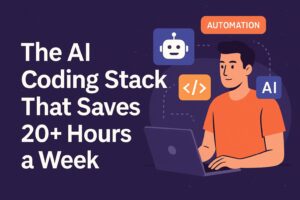🧠 Introduction
In 2025, AI isn’t just changing how we code — it’s changing who wins the time game. Developers who embrace AI workflows are building faster, debugging smarter, and launching more projects than ever before.
Over the past few months, I’ve explored dozens of AI-powered tools that are making serious noise in the developer community. Some I’ve used. Some are on my radar. Others are becoming go-to recommendations from top engineers, indie hackers, and open-source maintainers.
This post is a curated collection of the most powerful AI tools that are actively helping developers save 10, 15, even 20+ hours every week — without sacrificing quality.
Whether you’re building side projects, managing client work, or scaling a startup, this stack can transform your productivity.
⚙️ The AI Coding Stack That’s Changing How Devs Work
🧠 1. Codeium — The Best Free Autocomplete Tool Right Now
Use for: Fast code suggestions, refactoring, multilingual code writing
Why developers love it:
- Lightning fast autocompletion
- Works on VS Code, JetBrains, Jupyter
- 100% free with no catch
🔍 Dev Use Case: Autocompleting Python functions, boilerplate React code, or converting from JavaScript to TypeScript.
💻 2. Cursor — The VS Code Replacement Powered by GPT-4
Use for: Full-context chat-based coding inside your entire repo
Why it stands out:
- It reads your entire codebase
- Ask questions like “Why is this function slow?” — and it replies intelligently
- GPT-4 integrated, works like magic for legacy projects
🧪 Real World Tip: Many devs are now using Cursor instead of VS Code — it’s that good.
✍️ 3. GitHub Copilot Chat — The Classic Assistant, Supercharged
Use for: AI pair programming, regex help, writing tests
Why developers still use it:
- Trained on billions of public code snippets
- Integrated with GitHub, great context awareness
- New “Chat” mode answers questions about your project
⚡ Great for: Refactoring spaghetti code, converting pseudocode to working functions.
🔗 https://github.com/features/copilot
🔒 4. Continue.dev — Open Source AI in Your Editor
Use for: Local LLMs, privacy-friendly AI pairing
Why it’s trending:
- Supports Ollama, LocalAI, GPT-4, Claude
- Developer-friendly, minimal bloat
- No need to send your code to a cloud API
🛡️ Use Case: Sensitive client code, self-hosted LLM workflows
🤖 5. Prompt Engineering Libraries (for Smarter Code Prompts)
Use for: Improving the quality of AI outputs
Why it matters:
- Great prompts = better code generation
- Reusable snippets save time across tools
- Helps train your “AI communication” skills
🔗 https://www.promptingguide.ai
📚 6. Auto-Generate Docs with AI Assistants + Docsify
Use for: Instantly generating docs, READMEs, and API guides
Why it’s useful:
- Takes the boring part out of dev work
- Use ChatGPT to explain code files
- Pair with Docsify to auto-deploy docs
🚀 7. Raycast AI — A Dev’s Favorite Mac Productivity Booster
Use for: Snippet generation, command launches, smart search
Why devs use it:
- Minimal UI, Mac-native
- Add AI packs to query, debug, and explain code fast
- Keyboard-centric workflow
📊 8. Uptime Kuma + AI Log Summaries
Use for: Monitoring your apps, then summarizing logs with GPT
Why it’s cool:
- Free alternative to Pingdom or StatusCake
- Self-hostable, dev-friendly
- Combine with GPT to generate plain-language incident reports
🔗 https://github.com/louislam/uptime-kuma
🧩 How Developers Use This Stack (Real Time-Saving Use Cases)
| Task | Tool Used | Time Saved |
|---|---|---|
| Code autocomplete | Codeium/Copilot | 3–4 hrs |
| Debugging & error explanations | Cursor | 2–3 hrs |
| Writing docs/README | ChatGPT + Docsify | 2 hrs |
| Task automation | Raycast AI | 1–2 hrs |
| Monitoring + summary reports | Uptime Kuma + GPT | 1–2 hrs |
| DevOps scripting | Continue.dev | 2 hrs |
| Prompt libraries for reuse | Prompting Guide | 1 hr |
| Total Weekly Time Saved | — | 12–16+ hrs |
💡 Even with just 2–3 tools from this list, devs are reclaiming hours every single week.
💡 Not All Tools Are Plug-and-Play — Start Simple
If you’re new to AI tools:
- ✅ Start with Codeium (it’s free and easy)
- ⚙️ Move to Cursor if you work with large projects
- 🔐 Use Continue.dev if privacy matters
- 🛠️ Add Docsify + GPT to automate your docs
- 🧠 Learn Prompt Engineering to get the most from LLMs
🧠 Why This Stack Works in 2025
- Fast feedback loops (autocomplete + chat-based assistants)
- Low learning curve (tools integrate into your IDE)
- Better context awareness (read your whole repo, not just one file)
- No-code automation (like smart test writing and README generation)
This isn’t the future — it’s the developer experience now.
🔗 Related Articles to Read Next
- Top AI Coding Assistants You Can Use for Free
- Prompt Libraries Are the New Frameworks in AI Coding
- Cursor AI vs GitHub Copilot: Which One Wins?
- Best JavaScript Debugging Tools 2025
🙋♂️ FAQ
Q: Do I need to be a pro developer to use these tools?
No. Most tools are beginner-friendly and come with onboarding tutorials.
Q: Will AI replace my job as a developer?
Not anytime soon — but it will replace parts of your workflow. Learning how to use AI is now part of being an efficient developer.
Q: Are these tools free?
Many offer generous free tiers. Codeium, Continue.dev, and Uptime Kuma are completely free.
Q: Can I use these in teams or commercial projects?
Yes, but check each tool’s licensing and privacy policy, especially for client work.
✅ Final Thoughts
You don’t have to use every AI tool out there — but you do need to stay ahead of the curve.
By slowly building your own AI coding stack, you’re not just keeping up with the industry — you’re putting yourself ahead of 90% of developers who still rely on old workflows.
🔧 Start with one tool. Learn it. See the time it saves. Then stack the next.





